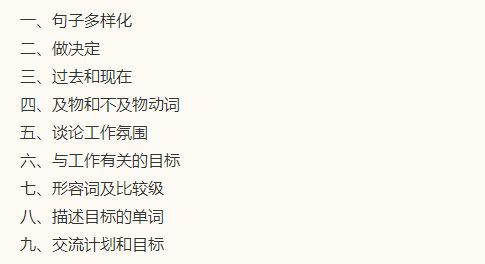Topic: Work and life
一、句子多样化
为了让阅读更加有趣,作者会变换句子长度和句型。注意本段中不同句子长度的生动效果。
I thought it would be easy to find a good job and support myself once I graduated from college. Now that I've applied for more than 100 jobs, I realized I was mistaken. Jobs don't come easy. Rent is unreasonable. And I live from paycheck to paycheck. In fact, I'm no longer sure where I want to be in life. Life can be hard, but I'm not giving up.
生动有趣的文本配合使用 simple、compound 和 complex 三种句型。以下是 simple sentences 的例子,它们只有一个分句。
Jobs don't come easy.
Rent is unreasonable.
以下为 compound sentences 的例子,这种句子可以有多个主句(可独立作为句子的分句),主句之间以逗号 ( , ) 或 and、but、however 或 so 等词相连。
Rent is unreasonable, and I live from paycheck to paycheck.
Life can be hard, but I'm not giving up.
以下是 complex sentences 的例子。这种句子可以有一个主句和一个从句(不是完全句的分句),以 once、now that、 although、because 或 that 等词连接。
I thought it would be easy to find a good job and support myself once I graduated from college.
Now that I've applied for more than 100 jobs, I realized I was mistaken.
二、做决定
用这些表达方式谈论你已经做的决定或正考虑做的决定。
We're wondering if we should start a family. 我们想知道我们是否应该开始一个家庭。
We're thinking about adopting a child. 我们正在想收养一个孩子。
I made a decision to go back to college. 我决定回去上大学。
We decided against moving to the country. 我们决定不搬到乡下去。
We realized that we want something different. 我们意识到我们想要些不同的东西。
三、过去和现在
过去事件
如果某事发生在过去的特定时间,使用过去时态的动词,像moved,或者saw。如果发生在未说明的时间,使用have+ 过去分词,像have seen* 或have happened。
We moved to New Zealand 10 years ago. 我们十年前搬去了新西兰。
We've only seen each other once since college. 自从大学后我们彼此仅见过一面。
连接过去和现在
如果一个事件从过去开始并持续到现在,使用have + been + 动词 + ing。增加详细的时间,使用for加上一段时间,和since**加上过去的一个具体点。
Stella has been teaching in a university for five years. 丝戴拉已经在大学教书五年了。
I've been working at a design firm since September. 自从九月份以来我一直在设计公司工作。
四、及物和不及物动词
有些动词后接宾语,有些不接。请看以下例子:
I ran.
I picked.
I run 不必后接宾语。这位男子干了什么?他跑步。我们无需添加任何信息,这句话也说得通。但是,I picked 需要接宾语。这位女子摘了什么?我们不知道。只有添加宾语意思才完整:
I picked oranges.
及物动词
及物动词必须后接宾语。
Rick asked them to take the survey. Rick 求他们做调查。
I'll fill the glasses. 我会把玻璃杯倒满。
She invited him to the party. 她邀请他参加派对。
They picked strawberries to eat for dessert. 他们摘了草莓做甜点。
不及物动词
不及物动词从不后接宾语,但常后接副词或介词词组,比如 carefully 或 in Paris。
I was working in Paris. 我在巴黎工作。
I listened carefully. 我仔细听。
多数感官动词,比如 watch、see 和 hear 既可接宾语,又可不接宾语。
Let's watch the news. 让我们一起看新闻。
She watched as I worked. 我做事的时候她在看。
Yes, we've seen the survey. 是的,我们看过调查了。
You can't see out of the window. 你不能看到窗外。
I heard the phone. 我听见电话响了。
She can't hear very well. 她听力不大好。
五、谈论工作氛围
使用类似表达谈论工作氛围。
I'm trying to create a lively atmosphere. 我试图营造活泼的氛围。
It makes a difference when you work with nice people. 跟和善的人一起工作时,情况大不一样。
I'm feeling totally burned out. 我整个人感觉筋疲力尽。
使用类似表达谈论你工作中的逐渐变化。
Job satisfaction fell steeply last year. 工作满意度去年大幅降低。
Things were awful before because of the long days. 由于工作时间长,以前没什么好事。
This job's turned into a good thing. 这份工作现在成好事了。
六、与工作有关的目标
这是一些交流常见的员工业务objectives (目标)的表达方式。
John needs to be proactive in finding and fixing defects. 约翰需要积极主动地发现并解决缺陷。
I will become involved in the early stages of project planning. 我将参与到项目计划的早期阶段。
Roger should play a role in the design stage of products. 罗杰应该在产品的设计阶段起作用。
Mary needs to point out problems in our manufacturing process. 玛丽需要指出我们在生产过程中的问题。
Ron needs to lead the development of our new software. 罗恩需要去领导我们新软件的开发。
Sherry has to take responsibility for her team's missed deadlines. 雪莉要承担她的团队错过最后期限的责任。
The whole team needs to submit annual objectives that are clear and detailed. 整个团队需要提交清晰具体的年度目标。
七、形容词及比较级
用-er来比较
当你使用单音节形容词来陈述目标时,加-er来进行比较。
We want him to develop a faster design process. 我们希望他能开发出更快的设计过程。
用more来比较
更长一些的形容词,加more。
As an area for improvement, you have to be more proactive. 作为一个可以改进的方面,你必须更加积极主动。
以-y结尾的形容词
以-y结尾的双音节形容词,改-y为-i 再加-er。
She needs to be involved earlier in the process. 她需要在过程中更早地参与进来。
不规则形容词
一些形容词有不规则的比较形式。注意bigger在词中间加有一个额外的g。
He's a good worker, but we need him to get better fast! 他是一个好的员工,但是我们需要他快点变得更好!
We want you to play a bigger role in the future. 我们希望你在将来能起到更大的作用。
八、描述目标的单词
使用这些形容词帮助你描述目标。
Getting an MBA in the next five years is a realistic goal 在接下来的五年获得工商管理学硕士学位是个现实的目标。
You need more details in your goals. They have to be specific. 你的目标需要更详细。他们必须是具体的。
Getting an online certificate in project management within two years is an attainable goal. 两年内获得项目管理在线证书是个能达到的目标。
Studying computer programming is consistent with your goal of getting a job in a tech company. 学习电脑编程和你很想在科技公司找到工作的目标是一致的。
Your goal of becoming a CEO someday is great because it's ambitious. 你希望某天成为一名首席执行官的目标是了不起的,因为它是雄心勃勃的。
九、交流计划和目标
使用这些表达方式交流你的意图和目标。
A: Where do you want to be or plan to be in five years? 将来的五年你想去哪或者打算要去哪?
B: I plan to be a designer in a large corporation. 我计划在一家大公司里作一名设计师。
A: What are you going to do after college? 毕业后你打算做什么?
B: I intend to work as an accountant. 我想做会计师工作。
A: Did you look at the questions I gave you? 你看我给你的问题了吗?
B: Yes. They really helped me set my career goals. 是的。他们真的帮了我确立我的职业目标。
A: What is a next step for today or tomorrow for you to achieve your goals? 为了实现你的目标,下一步在今天或者明天做什么?
B: I need to do an informational interview. 我需要做一个信息采访。
